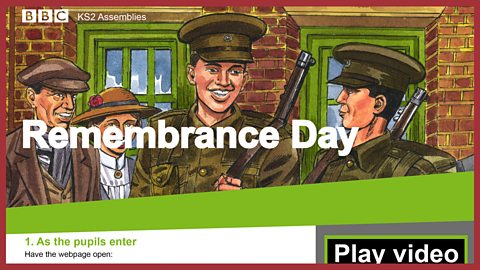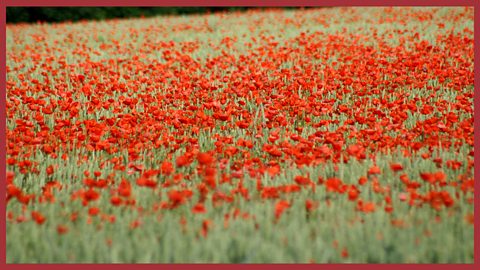In short...
Themes: Remembrance Day (11 November); remembering; 100+ years since The Armistice.
Summary: On Remembrance Day we remember all those whose lives have been affected by conflict since World War 1, and those who have died in particular. 11 November 2018 marked one hundred years since the signing of The Armistice, which brought WW1 to an end. This assembly explores 'remembering' and the video clip features a story about a soldier from WW1 recording his experiences in his diary.
Resources: the and an .

The video
September, 1914. Walter Bush records in his diary how he enlists in the army with best friend, Harry Parker, and how they travel to the trenches of the Western Front. Harry is eager for action, but when their turn comes to go 'over the top' Walter is injured by a shell and resumes his diary in a military hospital in England.
Once he has recovered it is his painful duty to visit Harry's mother - to tell her what he knows of the circumstances of Harry's death in the same attack. Walter tells Mrs Parker that he was with Harry at the end and that he 'didn't suffer' - though in reality he knows nothing about Harry's death. Walter says he will always remember Harry - and all the others he fought alongside.
Duration: 6' 28"
End of speech: 'β¦I won't forget a single one of them. Not ever.'
Video questions
- How does Walter's mother react to him 'signing up'? (She is anxious and tells Walter he is 'stupid')
- What happens when the soldiers' train nears the coast? (The happy mood changes to apprehension)
- What does it mean to 'go over the top'? (Climb out of the trenches to begin an attack)
- What signal is used to start the attack? (Whistles are blown)
- How is Walter injured? (He loses a leg, which is replaced with an artificial one)
- What does Walter know about Harry's death (Only that they went over the top together and Harry never came back)

Key links
Download / print the assembly framework ready for use

Click to display the image full-size


Suggested framework
1. Entry music
'Nimrod' from the 'Enigma Variations' Op 36 by Elgar features in many formal acts of Remembrance. See 'Related links' below for an audio file of 'The Last Post' and a link to our collection of WW1 song medleys which provide instrumental versions.
2. Introduction
Lead a discussion about remembering with some or all of the following questions: What is your earliest memory? What do you remember about your first day at this school? Do you remember how you felt? Who knows what Remembrance Day is? Then:
Remembrance Day is a special day for remembering. It happens on 11 November each year and it remembers the day in 1918 when the First World War ended with the signing of an agreement called 'The Armistice'. This year the commemoration happens exactly 100 years since that war ended. One hundred years is a long time - and the lives of the people who lived then can seem remote from our own lives today. So to find out more about being a soldier in World War 1 - and why we choose to remember - we're going to watch a story called 'A soldier's tale'.
3. The video
Play the video. The duration is 6' 28" and the final words are: 'β¦forget a single one of them. Not ever.'
4. After the video
Use the Video questions (above) to help children to talk about the story they have watched:
- How did Walter's mother react to him 'joining up'?
- How did the soldiers react as their train neared the coast?
- What does it mean to 'go over the top?'
- What signal was used to start the attack?
- What injury did Walter receive?
- What does he know about the circumstances of Harry's death?
5. Time to talk
Lead a discussion on why it is important to remember those people whose lives have been affected by war - and those people who have lost their lives in particular.
6. Opportunity to sing
An opportunity to sing your chosen song. Suggestions from ΒιΆΉΤΌΕΔ collections appear below.
7. Opportunity for reflection
Today we've been thinking about remembering - and about remembering those people whose lives have been affected by wars and conflict in particularβ¦
Think quietly about why it is important that we remember those peopleβ¦
And think about a special memory that you have - perhaps a special personβ¦or a special place.
You could bring the reflection to a close by reading the words from Laurence Binyon's poem 'For the fallen':
They shall grow not old, as we that are left grow old
Age shall not weary them, nor the years condemn.
At the going down of the sun and in the morning
We will remember them.
Or you could close the reflection by playing the extract from (also in 'Related links').
8. Opportunity for prayer
Use your usual form of address ('Dear God', 'Lord Jesus' etc) and:
At this time of remembering, we want to pray for those whose lives have been affected by war.
We are grateful for those men and women who fought for our freedom.
Amen.

Suggested songs
Song: 'Peace is flowing' (Come and Praise, no 144. Vocal version)
Peace is flowing like a river,
Flowing out through you and me,
Spreading out into the desert,
Setting all the people free.Love is flowing like a river,
Flowing out through you and me,
Spreading out into the desert,
Setting all the people free.Joy is flowing like a river,
Flowing out through you and me,
Spreading out into the desert,
Setting all the people free.Hope is flowing like a river,
Flowing out through you and me,
Spreading out into the desert,
Setting all the people free.
Song: 'Chain of love' (All about our school, no 14. Vocal version)
- For the children of tomorrow
Weβve got to make it a better place,
Fill the world with love and laughter,
Make a fresh start for the human race.
(Chorus)
Chain of love, chain of love,
Circle the world with a chain of love,
Chain of love, chain of love,
Circle the world with a chain of love.
- No more war and no more hunger,
No more jealousy and hate,
Say goodbye to greed and sadness,
Make a change now or it will be too late.
(Chorus)
(Middle eight)
Circle the world, circle the world,
Circle the world, circle the world.
- Doesnβt matter where you come from,
Doesnβt matter where youβve been,
Different race or creed or colour,
We are the same underneath our skin.
(Chorus)
Chain of love, chain of love,
Circle the world with a chain of love,
Chain of love, chain of love,
Circle the world with a chain of love.
Circle the world with a chain of love.

Related links
